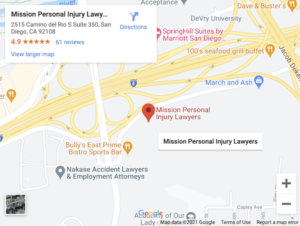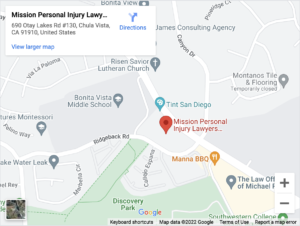
A third party claim alleges that another party is liable for your injuries and damages. Injured parties file third party claims in personal injury cases. Injured workers may also have third party claims for a workplace accident.
Table of Contents
First Party vs. Third Party Insurance Claims for Car Accidents

At-fault states require drivers to have liability insurance coverage to compensate accident victims when a driver causes a car crash. California requires drivers to have minimum liability coverage. Some states also required drivers to have no-fault insurance, known as PIP or MedPay.
In a first party insurance claim, the policyholder files a claim against their auto insurance coverage. For example, if you have PIP coverage, you can file a first party claim for medical bills regardless of who caused the car accident. Another example of a first party claim with your own insurance company would be an uninsured motorist claim or a claim under your collision coverage.
A third party liability claim is a claim you file with another party’s insurance company. For example, you can file third party personal injury claims for traffic accidents, dog bites, slip and fall accidents, medical malpractice, and other injuries. You will file the claim against the insurer for the party that caused your injury.
Suppose the insurance company for the other party refuses to pay your personal injury claim or the party does not have insurance coverage. In that case, you could file a personal injury lawsuit against the party who caused your injury.
Third Party Claims for Work Injuries and Accidents
Workers’ compensation insurance covers most work-related injuries. Therefore, if you are injured at work, your exclusive remedy is to file a workers’ compensation claim. Generally, injured workers cannot sue their employers except under very limited circumstances.
However, workers might have a third-party claim if another party caused their accident or work injury.
For example, a worker injured by a defective tool could file a claim against the manufacturer under product liability laws. Likewise, a worker injured on another person’s property while performing work might have a third party claim against the property owner under premise liability laws.
Filing a workers’ compensation claim does not prevent you from filing a third party claim. Filing a third party claim could entitle you to damages that workers’ compensation does not cover.
What Types of Damages Could I Receive for a Third Party Claim?
Generally, injured parties can recover compensation for their economic damages or monetary losses. Those damages include:
- Lost wages and benefits
- Past and current medical bills
- Future medical expenses
- Out-of-pocket expenses
- Long-term nursing care
- Personal care and household services
- Diminished earning capacity
They could also recover compensation for non-economic damages. In a workers’ compensation case, the worker is not compensated for pain and suffering damages unless they can file a third party claim. Examples of this type of damage include:
- Mental anguish and emotional distress
- Scarring and disfigurement
- Loss of enjoyment of life
- Physical pain and discomfort
- Impairments and disabilities
- Decrease in quality of life
How much a third party claim is worth depends on the facts of the case. For example, a person’s injuries, contributory fault, and insurance coverage could impact the value of an injury claim.
The best way to know the value of your third party claim is to talk with a San Diego injury lawyer. The insurance company undervalues claims. An accident attorney ensures all damages are included in the claim and valued at the correct amount to maximize recovery.
Proving Liability for a Third Party Claim
Most third party claims are based on negligence. You must have sufficient evidence to prove your claim by a preponderance of the evidence to establish liability. That means there is a greater chance that the allegations against the other party are more true than not true.
Injured parties have the burden of proving:
- Duty of Care – The other party had a legal duty of care to act with reasonable care to avoid causing you injury or harm
- Breach of Duty – The other party’s acts or omissions failed the “reasonable person” standard of care
- Causation – The breach of duty was a direct and proximate cause of your injury
- Damages – You incurred damages because of the other party’s breach of duty
If you cannot prove each of the above elements, you cannot recover any money for your damages. It is important to note that some first party claims could require you to prove fault.
For example, filing an uninsured or underinsured motorist claim requires you to prove the other driver caused the accident before receiving any money from your insurance provider. However, workers’ comp is a no-fault system. Therefore, you do not need to prove negligence to receive workers’ comp benefits, but you would if you filed a third party claim.
Contact Us for a Free Consultation With Our San Diego Personal Injury Lawyers
Third party claims can provide additional compensation after an injury or accident. Contact our law firm to schedule your free consultation with an experienced San Diego personal injury attorney at (619) 777-5555 to discuss your case. Mission Personal Injury Lawyers team is here to help you get the money you deserve.


